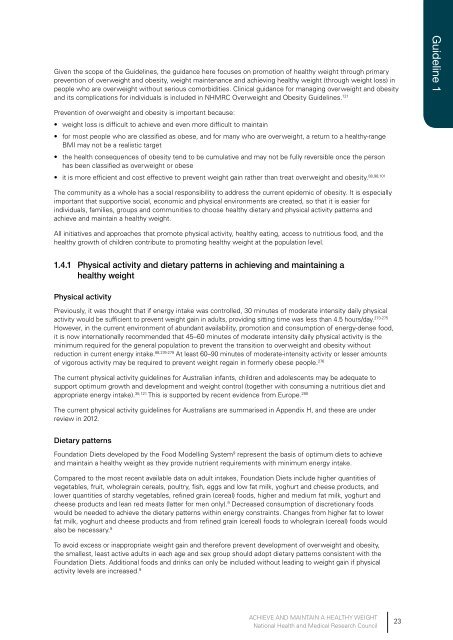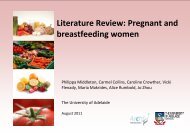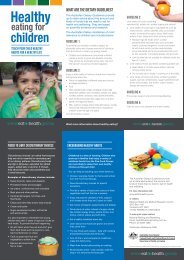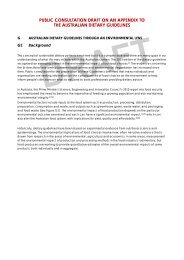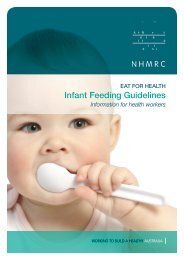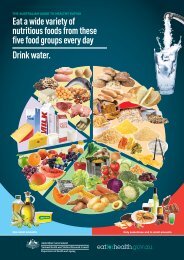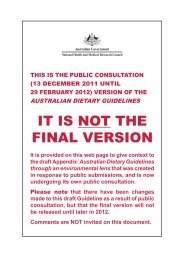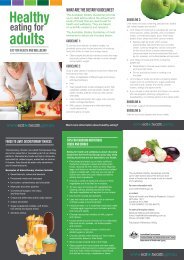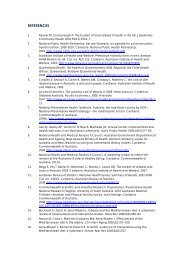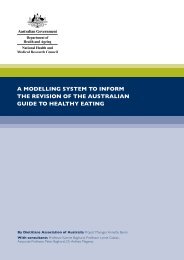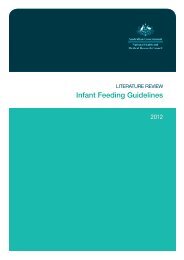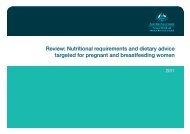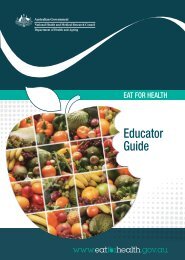Guidelines Dietary - Eat For Health
Guidelines Dietary - Eat For Health
Guidelines Dietary - Eat For Health
- No tags were found...
You also want an ePaper? Increase the reach of your titles
YUMPU automatically turns print PDFs into web optimized ePapers that Google loves.
Given the scope of the <strong>Guidelines</strong>, the guidance here focuses on promotion of healthy weight through primaryprevention of overweight and obesity, weight maintenance and achieving healthy weight (through weight loss) inpeople who are overweight without serious comorbidities. Clinical guidance for managing overweight and obesityand its complications for individuals is included in NHMRC Overweight and Obesity <strong>Guidelines</strong>. 121Guideline 1Prevention of overweight and obesity is important because:• weight loss is difficult to achieve and even more difficult to maintain• for most people who are classified as obese, and for many who are overweight, a return to a healthy-rangeBMI may not be a realistic target• the health consequences of obesity tend to be cumulative and may not be fully reversible once the personhas been classified as overweight or obese• it is more efficient and cost effective to prevent weight gain rather than treat overweight and obesity. 88,98,101The community as a whole has a social responsibility to address the current epidemic of obesity. It is especiallyimportant that supportive social, economic and physical environments are created, so that it is easier forindividuals, families, groups and communities to choose healthy dietary and physical activity patterns andachieve and maintain a healthy weight.All initiatives and approaches that promote physical activity, healthy eating, access to nutritious food, and thehealthy growth of children contribute to promoting healthy weight at the population level.1.4.1 Physical activity and dietary patterns in achieving and maintaining ahealthy weightPhysical activityPreviously, it was thought that if energy intake was controlled, 30 minutes of moderate intensity daily physicalactivity would be sufficient to prevent weight gain in adults, providing sitting time was less than 4.5 hours/day. 273-275However, in the current environment of abundant availability, promotion and consumption of energy-dense food,it is now internationally recommended that 45–60 minutes of moderate intensity daily physical activity is theminimum required for the general population to prevent the transition to overweight and obesity withoutreduction in current energy intake. 88,276-279 At least 60–90 minutes of moderate-intensity activity or lesser amountsof vigorous activity may be required to prevent weight regain in formerly obese people. 276The current physical activity guidelines for Australian infants, children and adolescents may be adequate tosupport optimum growth and development and weight control (together with consuming a nutritious diet andappropriate energy intake). 35,121 This is supported by recent evidence from Europe. 280The current physical activity guidelines for Australians are summarised in Appendix H, and these are underreview in 2012.<strong>Dietary</strong> patternsFoundation Diets developed by the Food Modelling System 9 represent the basis of optimum diets to achieveand maintain a healthy weight as they provide nutrient requirements with minimum energy intake.Compared to the most recent available data on adult intakes, Foundation Diets include higher quantities ofvegetables, fruit, wholegrain cereals, poultry, fish, eggs and low fat milk, yoghurt and cheese products, andlower quantities of starchy vegetables, refined grain (cereal) foods, higher and medium fat milk, yoghurt andcheese products and lean red meats (latter for men only). 9 Decreased consumption of discretionary foodswould be needed to achieve the dietary patterns within energy constraints. Changes from higher fat to lowerfat milk, yoghurt and cheese products and from refined grain (cereal) foods to wholegrain (cereal) foods wouldalso be necessary. 9To avoid excess or inappropriate weight gain and therefore prevent development of overweight and obesity,the smallest, least active adults in each age and sex group should adopt dietary patterns consistent with theFoundation Diets. Additional foods and drinks can only be included without leading to weight gain if physicalactivity levels are increased. 9Achieve and maintain a healthy weightNational <strong>Health</strong> and Medical Research Council23


